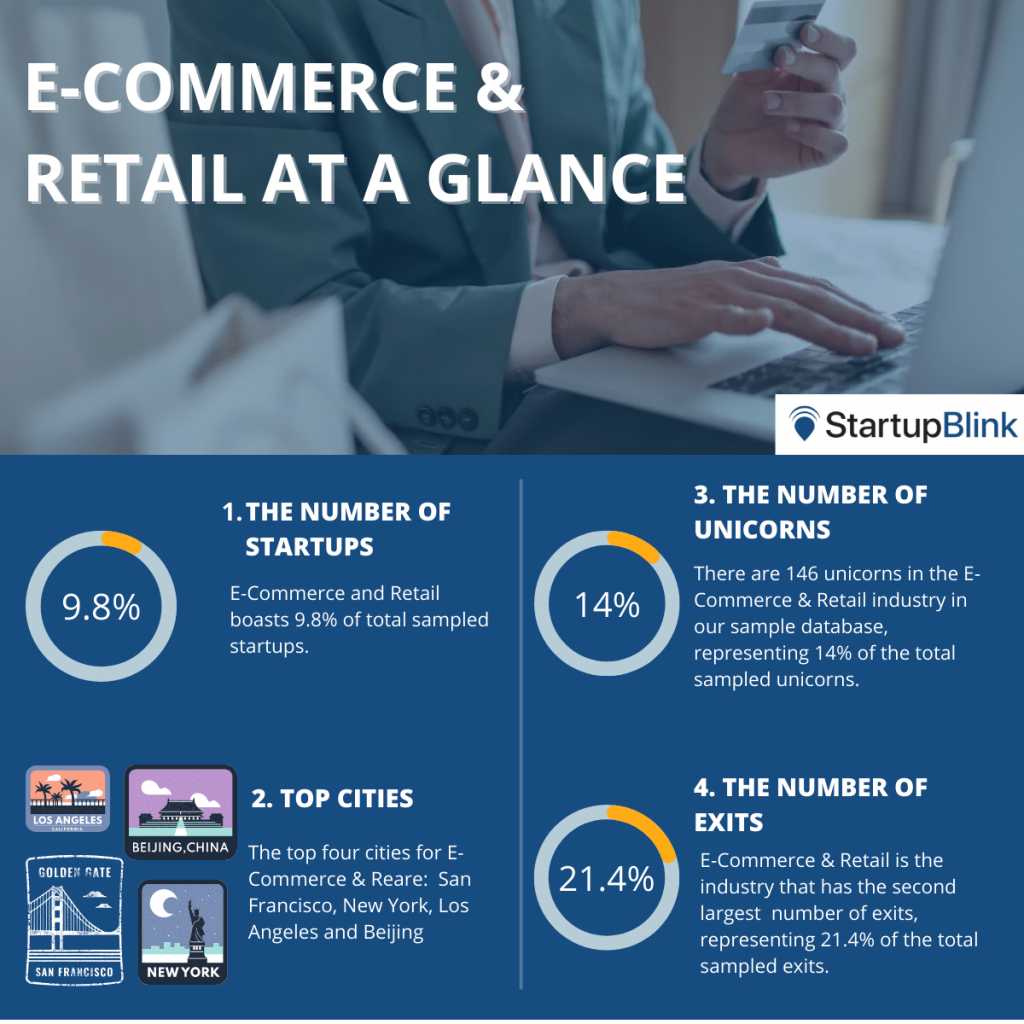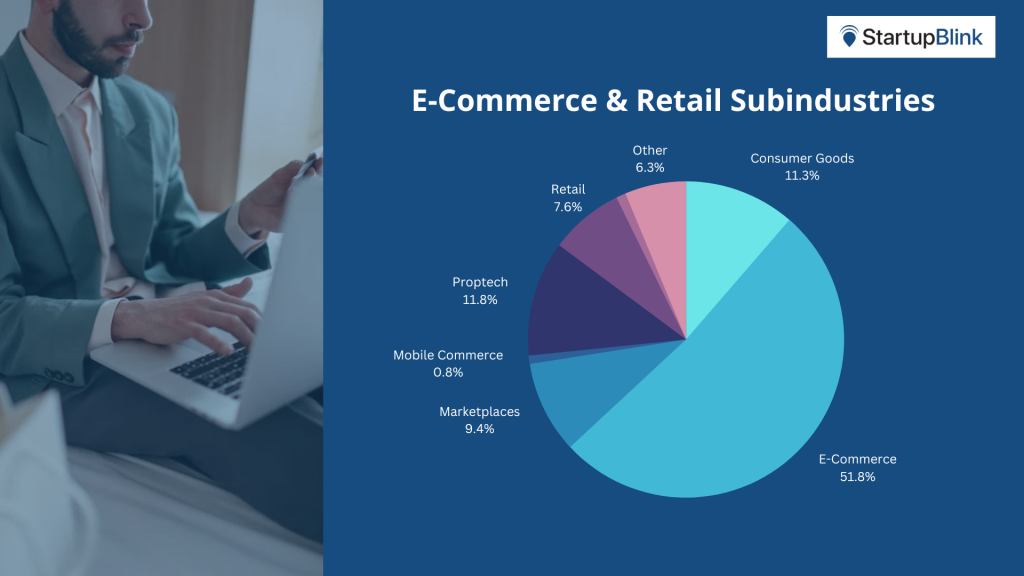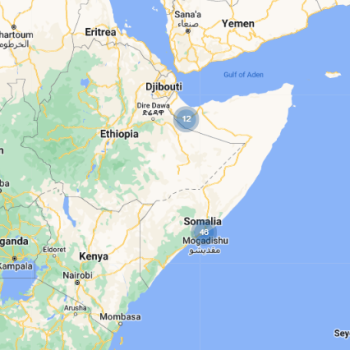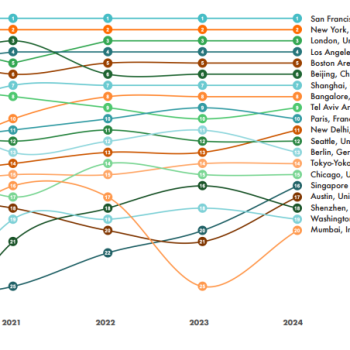Abstract
This report expands on the findings of StartupBlink’s Global Startup Ecosystem Index 2022 and depicts the state of E-Commerce & Retail startups in 2022. It is an in-depth look into the top 30 cities for E-Commerce & Retail Startups in 2022, as well as the notable startups, unicorns, pantheons, and exits. The E-Commerce & Retail data represents the third biggest industry for unicorns.
E-Commerce & Retail Industry at a Glance: Top Insights

➡️ In 2022, the E-Commerce & Retail Industry boasts 9.8% of our sampled startups. On the Startupblink Ecosystem Map, we have identified 8 sub-industries for E-Commerce & Retail Industry, with the biggest being E-Commerce (51.8%), followed by Proptech (11.8%) and Consumer Goods (11.3%).

➡️The E-Commerce & Retail Industry is the second largest industry for the number of exits, boasting 21.73% of total sampled exits. The 14% of total sampled unicorns are from the E-Commerce & Retail Industry, making it the third largest industry for the number of unicorns.
➡️The top seven cities for the E-Commerce & Retail industry are San Francisco, New York, Los Angeles, Beijing, Shanghai, London, and Boston.
➡️ A notable difference between 2021 and 2022 E-Commerce & Retail rankings is other cities catching up with San Francisco. From 2021 to 2022, the gap between San Francisco and the next contender decreased by 70.36%.
Ranking the top 30 Cities for E-Commerce & Retail
E-Commerce & Retail ranks fifth, boasting 9.8% of total sampled startups. The top 7 cities in the ranked order are San Francisco, New York, Los Angeles, Beijing, Shanghai, London, and Boston. In contrast to 2021, there are some slight changes in the top 7, such as New York (ranked 2nd in 2022) and Los Angeles (ranked 3rd in 2022) switching places. Shanghai jumped one spot, replacing London which used to be in 5th position. Like other industries, global cities are closing the gap with San Francisco. New York (ranked 2nd), Los Angeles (3rd), Beijing (4th), and Shanghai (5th) decreased their gap with San Francisco from 130%, 95.5%, 138.2%, and 363.9% to 38.5%, 58.6%, 111.1%, and 174% this year.
When we compare the industry rankings of the last year and 2022, most of the countries showed slight changes, going up or down with one-digit numbers. There are a few exceptions such as Toronto. The Ontario city successfully climbed 31 spots and ranks as the 29th startup hub for the E-Commerce & Retail Industry. On the other hand, Moscow (ranked 23rd) is the only city in the Top 30, that experienced a recognizable fall in the industry rankings by 12 spots.
In 2022, some cities have overperformed in their industry rankings in contrast to their global rankings. In this respect, Detroit (ranked 29th) is the most successful city, as the city jumped 28 spots. Barcelona (ranked 22nd), Philadelphia (ranked 20th), and Jakarta (ranked 18th) follow Detroit with an increase in their rankings by 16, 15, and 15 spots respectively. Despite its outstanding global ranking, Tel Aviv ranks (ranked 30th) 21 spots lower in the E-Commerce & Retail industry, making it the most recognizable underperforming city in the Top 30.
E-Commerce & Retail Pantheon Members in 2022
Pantheon member is a category coined by StartupBlink which includes companies or organizations that are no longer a startup or a unicorn but still have a substantial impact on their startup ecosystem and their brand. These Pantheons are categorized into three tiers depending on their impact and quality. Below are the pantheon members making a notable impact in the E-Commerce & Retail industry:
Zalando is a European online fashion platform, offering a broad variety of fashion for men, women, and children.
Jet.com is a smart shopping platform that allows its member to shop online from various retailers.
Shopify is a no-code platform for retailers who would like to build an e-commerce platform.
Etsy is an e-commerce site and a smartphone application for buying and selling handmade and vintage items.
Wish is an e-commerce shopping app, that promises a smart, fun, and rewarding shopping experience.
SenseTime is an AI software company focused on creating an AI-empowered future through innovation.
Rappi is a consumer tech company that specializes in providing online delivery services. It connects consumers who want to purchase prepared foods.
JUUL Labs is an American electronic cigarette company.
Jumia is a consumer goods e-commerce retail platform, offering all kinds of products in the Pan-African market.
- Flipkart
Flipkart is an e-commerce platform in India, that offers over 30 million products across 70+ categories.
E-Commerce & Retail Unicorns in 2022
Unicorns are startups that reached a valuation of one billion dollars or above. Below are the highest-ranked E-Commerce & Retail unicorns from the StartupBlink database.
Thumbtack is a home management platform, that makes it easier for homeowners to take care of their homeowners through its marketplace offering services from handymen, electricians, plumbers, and landscapers.
ezCater provides catering services for corporates through a network of more than 100 restaurants, connecting the restaurants to the businesses.
Agoura Hills, United States
Tipalti offers an Enterprise-Class Payout Management Solution. Tipalti’s SaaS streamlines and automates the way companies make payments to the masses.
Printful prints custom posters, t-shirts, canvas, framed art prints, and other print products and drop ships them to clients. It offers on-demand online printing fulfillment and shipping with an intelligent API so any e-commerce site can integrate with Printful.
Tokopedia is an online marketplace that enables Indonesian individuals and small business owners to open and maintain their online store easily and for free.
Trax is a cloud-based retail management platform that optimizes shopper experiences and monitors and analyzes insights to increase sales.
Scandit provides mobile barcode scanning solutions for smartphones, tablets, and wearable devices.
TechStyle Fashion Group is a fashion incubator that enables fashion startups to grow at a scale. The portfolio brands of TechStyle are first launched online and then springboard into new markets, categories, and omnichannel retail.
BeiBei is a maternal and infant product e-commerce platform that offers everyday discount sales of children’s clothes, shoes, and toys.
Zhaogang.com is a website that is specialized in steel trading information services for buyers and suppliers.
E-Commerce & Retail Exits in 2022
An exit for a startup occurs when the founder sells the company’s ownership to an investor or another company. It is a strategy for many startups that has been decided on since their establishment. Here are the top exits in 2022 for the E-Commerce & Retail industry according to the StartupBlink database:
Riskified is an eCommerce fraud management platform, helping internet retailers to grow revenue, reduce operating costs, and mitigate fraud.
Depop provides a mobile application that allows users to buy, sell, discover, and explore various things.
Toast has an Android tablet-based Point of Sale system for restaurants, helping them operate more efficiently and connect with their customer base in an innovative way.
- Coupang
Coupang is the leading South Korean e-commerce platform that is powered by innovative technology and operations.
Wish is an e-commerce shopping app, that promises a smart, fun, and rewarding shopping experience.
Auto1 Group is a marketplace for buying and selling used cars.
Unity’s real-time 3D development platform lets artists, designers, and developers collaborate to create amazing immersive and interactive experiences.
Farfetch delivers a unique shopping experience from one platform, offering a selection of luxury designer fashion for men and women.
SenseTime is an AI software company focused on creating an AI-empowered future through innovation.
Warby Parker is an online retailer of prescribed glasses, sunglasses, and eye examination tests at an affordable price.
Notable E-Commerce & Retail Startups
Fiverr is a marketplace for various different freelance services.
Narvar is a customer experience platform that helps retailers inspire long-term customer loyalty, at all steps of the post-purchase journey.
Melbourne, Australia
Redbubble gives independent artists a meaningful new way to sell their creations. Over 400k artists and designers across the planet connect with millions of passionate fans.
Almaty, Kazakhstan
Cloud service for automation of control, accounting of sales, and warehouse.
Button empowers brands to supercharge their mobile marketing revenue and engagement with privacy-first identity, industry-leading deep linking, and intelligent machine learning technology. Publishers use Button to power their mobile loyalty products driving more sales, more app users, higher average spending, and higher lifetime value.
Gumroad enables creatives to sell directly to their audience.
Teachers Pay Teachers is a community; the first and largest open marketplace where teachers share, sell/buy original educational resources.
Fort Lauderdale, United States
Depositphotos is a stock photo agency. Founded in 2009, it soon established itself as an economical alternative for stock photos and vector illustrations.
DHgate is an e-commerce platform that provides direct access to wholesale China products for businesses and consumers worldwide.
GrabFood is a same-day grocery delivery company, offering delivery in as little as one
Methodology
To ensure that the rankings are as accurate as possible, we have based our algorithm on objective, quantifiable data that can be comparatively measured across regions, countries, and cities. We refrained from using subjective tools such as surveys and interviews, and instead utilized data that was either accumulated directly from the StartupBlink map or has arrived from integration with a reliable global data partner. We allow as few assumptions as possible regarding cause and effect and focus on one thing: measuring results. We avoid relying on any theoretical models assuming the causes of success for startup ecosystems.
Every year our algorithm is more accurate, and it should be noted that the momentum change of each ecosystem is not only influenced by its achievements over the last year, but also by these algorithm improvements. We have been sampling startup ecosystem data on the curated and interactive StartupBlink Global Map, which enables us to test and perfect our algorithm based on vast sets of data. We estimate that the core map dataset has a representative sample covering 10-15% of total relevant entities in global startup ecosystems. In addition, hundreds of thousands of entities and data integrations are taken into account via our global data partners. Each location’s final score is based on the exact same algorithm. However, we are aware that our sample size fluctuates depending on location and data sourcing. Our only intervention in the score is discounting locations where we determined that the sample size of the entities is higher than average. In order to solve issues with lower than average sample size, we have partnered with approximately 100 Ecosystem Partners, most of which are Government agencies, many of them in locations where our data is limited. We offer all governments administrative access to curate the dataset of their ecosystems, at no cost, granting them complimentary access. On our rankings with Unicorns and Exits, we take into account the valuation of each startup and add some special filters to exclude government entities and corporate spin-offs.
The Methodology used in the 11 industry rankings, including Software and Data, is identical to the algorithm of the global rankings, while taking into account the startup database of each industry. However, the fintech Industry rankings are built on an official Fintech Ecosystem Portal: Findexable’s Global Fintech Map, which includes deeper algorithm changes that are customized according to the specific characteristics of the fintech industry.
Our Data Partners:









